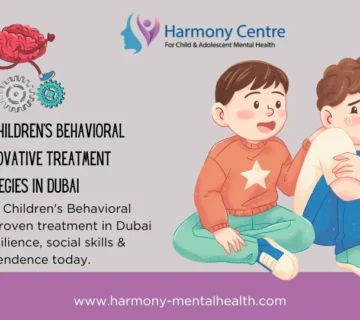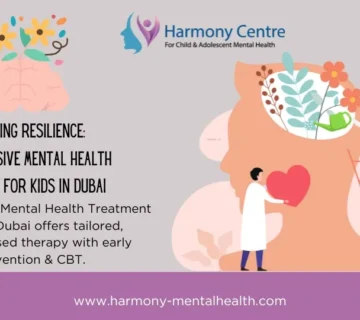Multilingual Mental Health Dubai: Enhancing Language Support for Comprehensive Care at Harmony Centre
Discover the benefits of multilingual mental health care in Dubai at Harmony Centre. Our diverse team offers language-inclusive support to ensure accessible, culturally sensitive treatment.
Contact Information
| Contact Method | Details |
|---|---|
| Phone | +971 (52) 8773268 / 04 558 2015 |
| Click Here | |
| info@harmony-mentalhealth.com | |
| Address | Office 409, Building Alrazi-64C, 26th St, Healthcare City, Dubai |
Introduction
In a city as diverse and cosmopolitan as Dubai, mental health care must speak the language of its people. At Harmony Centre Mental Health Dubai, we understand that effective communication is at the heart of quality care. With a multicultural population where families and individuals come from varied linguistic backgrounds, our commitment to multilingual mental health services is essential. Our expert team of therapists, psychologists, and psychiatrists is equipped to provide care in multiple languages, ensuring that language barriers never impede access to effective, evidence‑based mental health support.
Our integrated, culturally sensitive approach combines clinical excellence with language-inclusive care to create a supportive environment where every patient feels understood and respected. This article explores the importance of multilingual mental health care, outlines our innovative approach at Harmony Centre, and provides practical strategies for leveraging language support to enhance overall treatment outcomes.
Learn More About Harmony Centre • Contact Us
Understanding Multilingual Mental Health Care
What Is Multilingual Mental Health Care?
Multilingual mental health care involves providing therapy, counseling, and support services in multiple languages to accommodate the diverse linguistic needs of a population. This approach recognizes that language is not just a means of communication but also a crucial element in understanding cultural nuances, emotional expressions, and personal narratives. When mental health professionals can speak the same language as their clients, it fosters trust, improves comprehension, and enhances the overall therapeutic experience.
Core Elements of Multilingual Mental Health Care
- Language Inclusivity:
Delivering services in various languages ensures that patients can express themselves accurately and comfortably. - Cultural Sensitivity:
Language and culture are deeply intertwined; understanding a patient’s cultural context improves the relevance and effectiveness of care. - Effective Communication:
Clear, direct communication minimizes misunderstandings and helps clinicians accurately assess and treat mental health conditions. - Enhanced Therapeutic Alliance:
When patients feel understood in their native language, they are more likely to engage actively in therapy, leading to better outcomes.
The Importance of Language Support in Mental Health
Why Multilingual Services Matter in Dubai
Dubai is a global hub, home to people from all corners of the world. In such a diverse environment, offering mental health services solely in one language can inadvertently exclude significant portions of the population. Here’s why multilingual support is vital:
Overcoming Communication Barriers
- Accurate Expression of Emotions:
Patients are better able to describe their feelings and experiences in their native language, which is essential for accurate diagnosis and treatment planning. - Reduced Misunderstandings:
Language barriers can lead to misinterpretations of symptoms or concerns. Multilingual services ensure clarity and reduce the risk of misdiagnosis. - Enhanced Comfort and Trust:
Receiving care in a language one understands deeply builds trust and encourages patients to share more openly, enhancing the effectiveness of therapy.
Cultural Relevance and Sensitivity
- Respect for Cultural Identity:
Language is a key component of cultural identity. By offering services in multiple languages, Harmony Centre demonstrates respect for the cultural diversity of Dubai’s population. - Tailored Therapeutic Interventions:
Understanding the cultural context behind language enables therapists to tailor interventions that are culturally appropriate and more likely to resonate with patients. - Inclusive Community Engagement:
Multilingual services help create a sense of belonging and inclusion, making mental health care accessible to all community members, regardless of their language background.
Our Multilingual Approach at Harmony Centre
Comprehensive Assessments with Language Support
At Harmony Centre, our commitment to multilingual mental health care begins at the assessment stage. We ensure that every patient’s language needs are taken into account from the very first consultation.
Initial Consultation
- Language Preference:
During the initial appointment, we ask patients about their preferred language. This simple step ensures that the entire assessment process is conducted in the language they are most comfortable with. - Cultural and Linguistic Background:
We gather detailed information about the patient’s cultural context and linguistic background to better understand their unique needs and tailor the assessment accordingly. - Parental and Educator Input:
For children, input from parents and teachers is collected in their native language when possible, ensuring that observations and concerns are communicated clearly.
Standardized Testing and Observations
- Validated Tools in Multiple Languages:
We use assessment instruments that are available in various languages to ensure that cultural and linguistic nuances are accurately captured. - Direct Observations:
Our clinicians observe patients in settings where they are most comfortable, whether at home, in school, or during therapy sessions, to capture authentic behaviors. - Collaborative Feedback:
Input from all stakeholders is gathered in a way that respects the patient’s language preferences, ensuring a comprehensive and culturally sensitive evaluation.
Learn More About Our Assessment Process
Tailored Treatment Planning in Multiple Languages
Our multilingual approach extends to every aspect of treatment planning, ensuring that language support is integrated into personalized care.
Individual Therapy Sessions
- Therapeutic Communication:
Therapists conduct sessions in the patient’s preferred language, using culturally adapted therapeutic techniques that resonate with the patient’s background. - Evidence‑Based Interventions:
Our clinicians utilize evidence‑based practices such as Cognitive Behavioral Therapy (CBT), mindfulness, and play therapy in the patient’s native language, ensuring effective communication of complex concepts. - Language-Enhanced Therapy Tools:
Visual aids, interactive digital tools, and culturally relevant materials are used to reinforce therapy in a language that is easily understood.
Family and Group Therapy
- Family Counseling in Native Languages:
Family sessions are conducted in the language most comfortable for the family, which helps to foster open dialogue and mutual support. - Multilingual Group Sessions:
In group therapy, sessions may be conducted in multiple languages or with translation support, allowing diverse groups of children to benefit from shared experiences and peer support. - Culturally Adapted Interventions:
Therapeutic interventions are tailored to reflect the cultural norms and values of the patient, ensuring that the treatment is not only effective but also respectful of their identity.
Collaborative Goal Setting and Monitoring
- Clear, Measurable Objectives:
Goals are established collaboratively with patients and their families in their native language, ensuring clarity and commitment. - Regular Follow-Ups:
Continuous monitoring and feedback sessions are conducted in a way that maintains linguistic consistency, allowing for dynamic adjustments to the treatment plan. - Digital Integration:
Our telehealth platform and mobile apps support multiple languages, enabling ongoing support and tracking of progress in the patient’s preferred language.
Benefits of Multilingual Mental Health Care
For Patients
Enhanced Communication and Understanding
- Clear Expression of Emotions:
Patients can describe their feelings and experiences more accurately when speaking in their native language. - Improved Therapy Engagement:
A comfortable language environment fosters openness, trust, and active participation in therapy sessions. - Accurate Diagnosis and Treatment:
When language barriers are removed, therapists can obtain more precise information, leading to more effective and tailored interventions.
For Families
Empowerment Through Inclusive Support
- Family Involvement:
Families benefit from therapy conducted in their native language, enhancing their ability to support their loved ones. - Cultural Relevance:
Care that respects cultural and linguistic preferences strengthens the overall treatment experience and fosters long-term engagement. - Informed Decision-Making:
Clear communication enables families to understand therapy processes, treatment plans, and progress reports, empowering them to make informed decisions about their child’s care.
For Educators and the Community
Improved Collaborative Support
- Consistent Messaging:
When therapy and school support are conducted in the same language, there is better consistency in addressing the child’s needs. - Enhanced Social Integration:
Multilingual group sessions promote social inclusion, helping children from diverse backgrounds build strong, supportive relationships. - Broader Community Impact:
Public awareness campaigns and community initiatives conducted in multiple languages help reduce stigma and promote mental health care for all.
Practical Strategies for Embracing Multilingual Mental Health Care
For Families
Foster a Multilingual Home Environment
- Encourage Bilingual Conversations:
If your family speaks more than one language, encourage children to express themselves in both languages to build confidence and flexibility. - Utilize Multilingual Resources:
Access books, educational apps, and online materials in your preferred language to support your child’s learning and development. - Celebrate Cultural Heritage:
Integrate cultural traditions and languages into daily routines, reinforcing a positive identity and self‑esteem.
Engage Actively with Therapists
- Communicate Your Preferences:
Clearly state your language preferences during the initial consultation and throughout therapy sessions. - Participate in Workshops:
Attend parental workshops and webinars conducted in your native language to learn strategies for supporting your child’s mental health. - Monitor Progress:
Keep a journal in your preferred language to track improvements, challenges, and any adjustments needed in the treatment plan.
For Educators
Integrate Multilingual Strategies in the Classroom
- Multilingual Curriculum:
Incorporate lessons and materials in multiple languages to reflect the diverse linguistic backgrounds of your students. - Cultural Sensitivity Training:
Participate in professional development workshops on multicultural and multilingual education to better support all students. - Collaborate with Mental Health Professionals:
Work closely with therapists to ensure that classroom interventions align with the child’s therapy, using consistent language and culturally adapted strategies.
Support Peer Interaction
- Encourage Language Exchange:
Organize activities that allow students to share and learn languages from one another, fostering mutual respect and cultural exchange. - Group Projects:
Design group projects that encourage collaboration across linguistic lines, promoting inclusivity and social cohesion.
For the Community
Promote Multilingual Public Awareness Campaigns
- Culturally Relevant Workshops:
Organize community events that provide mental health education in multiple languages to reach a wider audience. - Online Resource Hubs:
Develop multilingual digital platforms that offer educational content, therapy resources, and interactive tools. - Advocate for Inclusive Policies:
Support initiatives and policy changes that ensure mental health services are available in multiple languages, reflecting the diverse needs of Dubai’s population.
Leverage Digital Platforms
- Telehealth with Multilingual Support:
Utilize our telehealth services, which offer consultations in various languages, to ensure continuous access to quality care. - Social Media Engagement:
Follow and engage with mental health organizations on social media that provide content in your preferred language. - Community Forums:
Join online forums and support groups where discussions are held in multiple languages, fostering a sense of community and shared understanding.
Explore Our Digital Resources
Get in Touch
Frequently Asked Questions about Multilingual Mental Health Dubai
Book a Consultation Now
Contact Information
Office Address:
Office 409, Building Alrazi-64C, 26th St, Umm Hurair 2, Dubai Healthcare City, Dubai
Phone:
+971 4 558 2015
+971 5 287 73268
Email:
info@harmony-mentalhealth.com
Final Thoughts about Multilingual Mental Health Dubai
Multilingual mental health care is essential for a diverse and vibrant city like Dubai. At Harmony Centre Mental Health Dubai, our commitment to language-inclusive, culturally sensitive care ensures that every individual receives support in the language they understand best. By integrating multilingual services into our evidence‑based, multidisciplinary approach, we empower patients, families, and educators to overcome language barriers and build a supportive network that enhances mental well‑being.
Invest in accessible, high‑quality mental health care with Harmony Centre—your trusted partner in creating a healthier, more inclusive future for all in Dubai.
Learn More About Harmony Centre
Get in Touch
👉 Book a Consultation Now: Call +971 4 558 2015 or visit www.harmony-mentalhealth.com.
Join our online community and stay updated with our latest events, articles about Multilingual Mental Health Dubai



